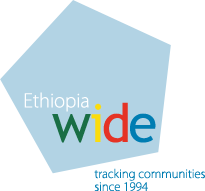Gelcha, Kereyu
Gelcha in 2011
Gelcha is bordered by the Metahara sugar factory, the Awash national park, the Addis-Dire Dawa main road and the expanding salty Lake Beseka. All negatively affect the pastoralist livelihood of the 75% Karrayu population (taking land and reducing mobility). The Lake is also flooding land and buildings, cutting off paths and roads, affecting water and causing malaria. 80 Somali and 50 Harar Oromo families form the rest of the population, entirely Muslim. About a third of the households are female-headed; 50 households are landless (8%) although it is not quite clear what this means in an economy dominated by pastoralism. There is no electricity. The mobile network arrived in 2009. A road passable by vehicles connects the centre to Metahara (the wereda centre) and to Addis Ketema (another small town) both at 5 km. Most people drink unsafe water or buy water in town at high cost. The kebele is flat, lowland, arid and hot, with shorter rainy seasons
There were four droughts in the last ten years; in 2010 a lot of livestock died. Pastoralism is under threat. Agriculture is heavily government-promoted. Yet in a good year rainfed production covers two to four months of food needs; livestock products and sale make up the rest. People therefore heavily depend on terms of trade for livestock, which are negative for both those selling livestock (high price but not enough to offset high costs of everything else) and those trying to buy some (price too high). There is irrigation on a limited scale (40 households use water from the factory discharge canal; 20-30 use a pump on the Awash, after a large 300-household cooperative failed a few years ago; a few young men sharecrop in irrigated land in neighbouring kebeles). People have high expectations from a plan to extend to Gelcha the spate irrigation scheme already covering some other kebeles. This has started to affect the way in which people relate to land rights. There are no agricultural packages. The wereda while promoting improved breeds does not provide them. Some PSNP beneficiaries got livestock packages in 2005/6 over which they were not consulted and, allegedly, not told that it was on credit. Some women engaged in shoat production (NGO credit) and in petty trade with success. The sugar factory provides permanent jobs for a few (mostly guards) and daily labour at harvest time. Other daily labour jobs can be found in nearby areas. The government and NGOs tried to organise various production cooperatives but most failed due to poor management and weak follow-up. 40% households have been assisted through the PSNP. This has been important for many but fuelled tensions vis-à-vis the kebele leadership accused of nepotism and between ethnic groups in the community, unresolved by the end of the fieldwork. Officials expect that the community as a whole will graduate when irrigation will be fully developed.
The health post is often closed as the HEWs (and most government employees) live in nearby towns. There is a recently constructed full-cycle school which is said to please the community. Other health and education services are available in Metahara and Addis Ketema. There is more behaviour change related to education than to health although even this is mixed as people see (Gr10 and above) graduates sitting idle or having to take anyone’s daily job. There is little change for women in relation to circumcision and polygyny, emerging change in relation to early marriage, and some women have started resisting widow’s inheritance and obtained divorce in these and other cases with their own family’s support. The community appreciates the infrastructure and service developments but feels that the government is not doing enough to help them cope with the deteriorating pastoralist livelihood. There are ambiguous relationships, tense at times or on specific issues, between ethnic groups in the community, the government and the community’s clan institutions, those following customary religious practices and some less accommodating Muslims, and between these stricter Muslims and the others and the government.
Gelcha in late 2011
Download PDF
